Welcome to the Wednesday, Oct. 20, 2025 Brew.
By: Lara Bonatesta
Here’s what’s in store for you as you start your day:
- A look at mayoral elections happening on Nov. 4
- In 215 races, both candidates share the same last name
- Thirty-nine members of Congress have announced they will not seek re-election in 2026, the most at this point since 2018
A look at mayoral elections happening on Nov. 4
There are less than two weeks to go until Election Day, and Ballotpedia will cover more than 10,000 elections on Nov. 4. To help our readers understand what’s at stake, the Daily Brew will feature previews of key elections from now through Election Day. To see what elections we're covering in your area, check out our Sample Ballot Lookup Tool.
Today we’re starting out with one of the offices closest to the people: mayors.
Nineteen of the 100 most populous U.S. cities are holding mayoral elections on Nov. 4. Seventeen of these cities have Democratic mayors and two have Republican mayors.
Twelve state capitals, including nine that fall outside of the top 100 most populous cities, are also holding mayoral elections on Nov. 4. Eleven of these cities have Democratic mayors and one has a Republican mayor.
Click here to see a full list of top 100 most populous cities and state capitols holding elections this year.
Ballotpedia identified six mayoral elections happening in the 100 most populous cities on Nov. 4 as battlegrounds. Three mayoral elections – in Minneapolis, Minnesota, New York, New York, and Seattle, Washington – are among our top 10 elections to watch this Nov. 4.
Here’s a look at the battleground mayoral races happening in the 100 most populous cities on Nov. 4:
Albuquerque, New Mexico: Six candidates are running. Incumbent Tim Keller and challengers Mayling Armijo, Louie Sanchez, Alexander Uballez, and Darren White lead in media coverage and fundraising. KOAT's Nick Catlin wrote, "A KOAT-Albuquerque Journal Poll found 37% of voters remain undecided less than a month until choosing who will lead the Duke City next.
Detroit, Michigan: Solomon Kinloch and Mary Sheffield are running. This is Detroit’s first open mayoral race since incumbent Mike Duggan was elected in 2013.
Miami, Florida: Thirteen candidates are running. Joe Carollo, Emilio Gonzalez, Eileen Higgins, Ken Russell, and Xavier Suarez lead in media attention, fundraising, and polling. In June 2025, the City Commission voted to postpone this election until 2026 in order to move city elections to even years. On July 21, a circuit court judge ruled that the ordinance conflicted with the Miami-Dade County charter because changing the city's election date would require a voter referendum. The changing of election dates has become an issue in the race.
Minneapolis, Minnesota: Incumbent Mayor Jacob Frey, Omar Fateh, and 13 other candidates are running in the nonpartisan general election. While the city's mayor has been a member of the state's Democratic-Farmer-Labor Party since 1978, this election has highlighted divisions within the larger party. Local media outlets have described the split as between democratic socialists or progressives and moderate or establishment Democrats, with Fateh belonging to the former group and Frey belonging to the latter.
New York, New York: Zohran Mamdani (D/Working Families Party), Curtis Sliwa (R/Protect Animals Party), Andrew Cuomo (Fight and Deliver Party), and seven other candidates are running to succeed incumbent Mayor Eric Adams (D), who suspended his campaign. In the primary, Mamdani defeated Cuomo in the third round of ranked-choice voting (RCV) 56% to 44%. Both candidates advanced to the general election because in New York, candidates can run on multiple party lines. This election has also highlighted splits in the larger Democratic Party. Mamdani is a state assembly member who describes himself as a democratic socialist, and Cuomo is the former governor of New York who describes himself as a moderate. Sliwa is a Republican and the founder of Guardian Angels, an organization focused on combating street crime.
Seattle, Washington: Incumbent Mayor Bruce Harrell and Katie Wilson are running. In the nonpartisan primary election, Wilson won 51% of the vote and Harrell won 41% out of eight candidates. The last incumbent Seattle mayor to win re-election was Greg Nickels in 2005.
Currently, the mayors of 66 of the country's 100 largest cities are Democrats. Republicans hold 23 mayoral offices, Libertarians hold one office, independents hold three, and five mayors are nonpartisan. Two mayors' partisan affiliations are unknown.

Currently, 35 state capitals have Democratic mayors, seven have Republican mayors, one has an independent mayor, and two have nonpartisan mayors. Five mayors' partisan affiliations are unknown.
So far this year, elections in two top-100 cities have resulted in a change in party control, with a net gain of one Democratic mayor and one nonpartisan mayor, and a net loss of two Republican mayors.
- Omaha, Nebraska: Democrat John Ewing Jr. defeated incumbent Republican Jean Stothert on May 13.
- Garland, Texas: Nonpartisan Dylan Hedrick was elected to succeed Republican Scott LeMay in the general runoff election on June 7.
In 2023, the last odd year, five of the top 100 most populous cities had changes in mayoral party control.
Click here to see our coverage of mayoral elections in 2025.
In 215 races, both candidates share the same last name
In 215 contests happening across 15 states in 2025, 438 candidates running for office share the same last name. All but one of these elections are nonpartisan. The partisan race is taking place in District 20 of the New York City Council between Allen Wang (Conservative Party), Steven Wang, and two other candidates.
The most common shared last name was Miller, which 12 candidates, all in Ohio, had. The next was Smith (eight candidates), followed by Johnson, Martin, and Graham (six candidates each).
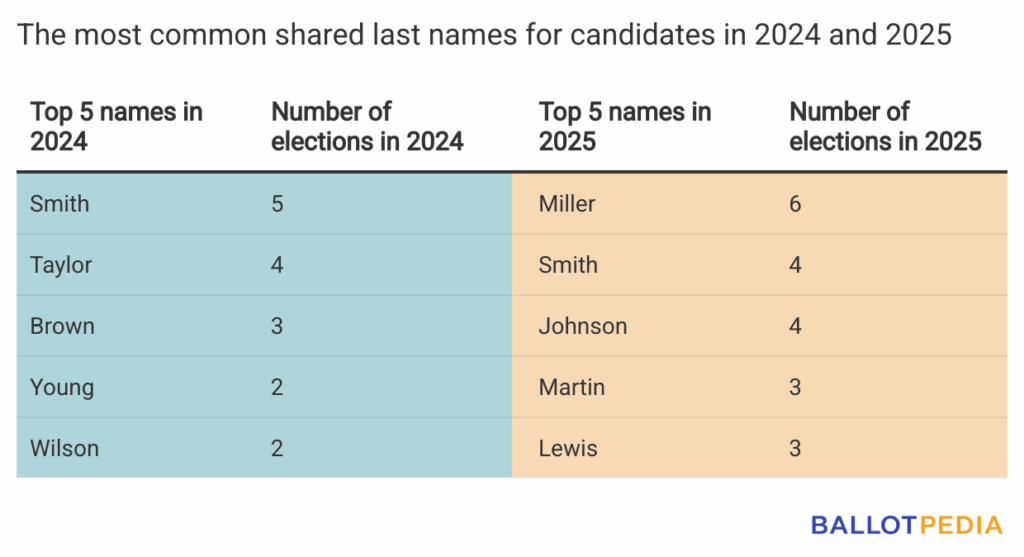
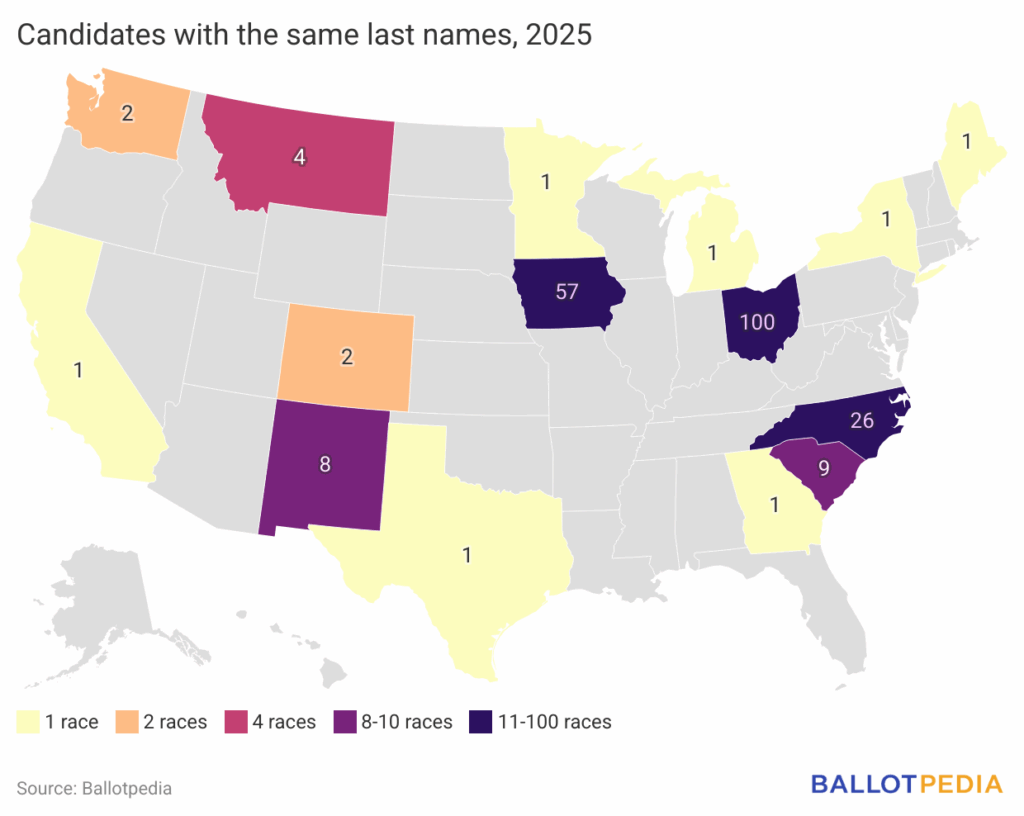
The state with the most contests where candidates share the same last name was Ohio, where 100 different races had at least two candidates sharing the same last name. The next was Iowa, which had 57 elections where candidates shared a last name. North Carolina was third with 26 elections. Every other state had fewer than 10 contests like this. Iowa also had the most elections where three candidates shared a last name, with four such elections.
To read more about this analysis, click here.
Thirty-nine members of Congress have announced they will not seek re-election in 2026, the most at this point since 2018
Thirty-nine members of the U.S. Congress—eight senators and 31 U.S. representatives—have announced they will not seek re-election in 2026. This is the most retirement announcements we have followed at this point since 2018.
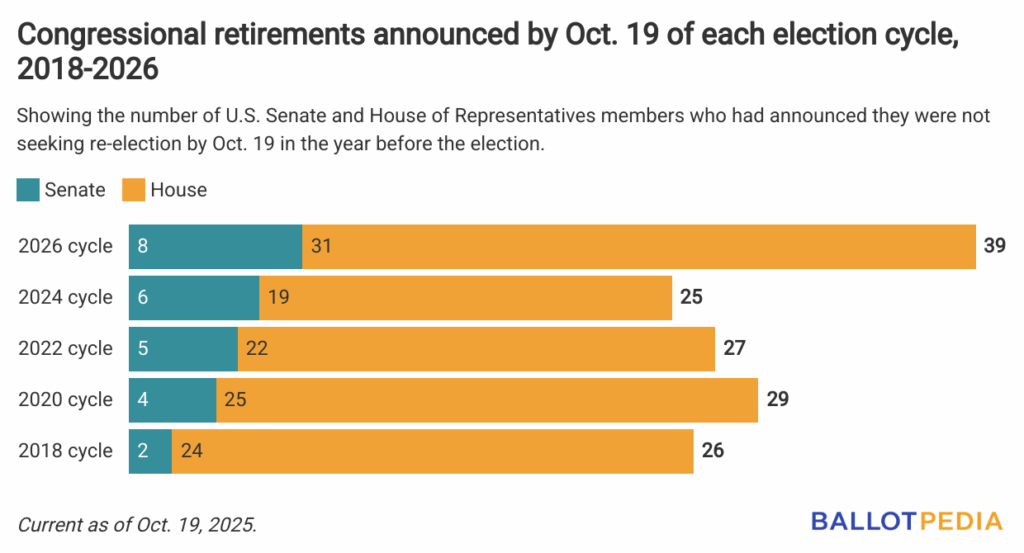
Since our Sept. 17 update, four U.S. House members have announced that they will run for other offices in 2026 rather than for another term:
- Rep. Seth Moulton (D-Mass.) announced on Oct. 15 that he will run for the U.S. Senate in Massachusetts. Race forecasters view the election for the district as either Solid or Safe Democratic.
- Rep. Wesley Hunt (R-Texas) announced on Oct. 6 that he will run for the U.S. Senate in Texas. Race forecasters consider the election for the district as either Solid or Safe Republican.
- Rep. David Schweikert (R-Ariz.) announced on Sept. 30 that he will run for governor of Arizona. Race forecasters view the election for the district as a Toss-up.
- Rep. Tom Tiffany (R-Wisc.) announced on Sept. 23 that he will run for governor of Wisconsin. Race forecasters believe the election for the district is either Solid or Safe Republican.
In total, 31 members of the U.S. House—11 Democrats and 20 Republicans—will not seek re-election in 2026. Of these members:
- Eight—five Democrats and three Republicans—are retiring from public office.
- Twelve—six Democrats and six Republicans—are running for the U.S. Senate.
- Ten—all Republicans—are running for governor.
- One Republican is running for Texas attorney general.
At this point in the last four election cycles, there were 25 retirement announcements in 2024, 27 in 2022, 29 in 2020, and 26 in 2018.
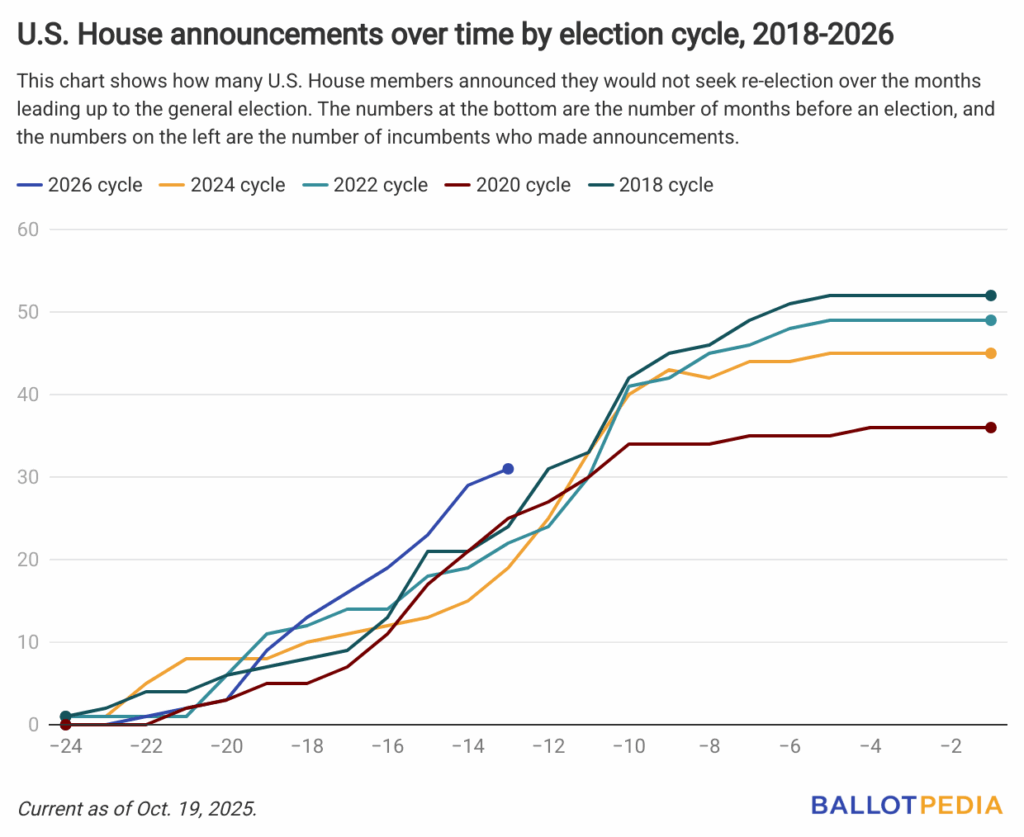
Eight senators—four Democrats and four Republicans—announced they will not seek re-election in 2026. Sens. Joni Ernst (R-Iowa), Thom Tillis (R-N.C.), Dick Durbin (D-Ill.), Mitch McConnell (R-Ky.), Jeanne Shaheen (D-N.H.), Tina Smith (D-Minn.), and Gary Peters (D-Mich.) are retiring from public office. Sen. Tommy Tuberville (R-Ala.) is running for governor of Alabama.
At this point in the last four election cycles, there were six retirement announcements in 2024, five in 2022, four in 2020, and two in 2018.
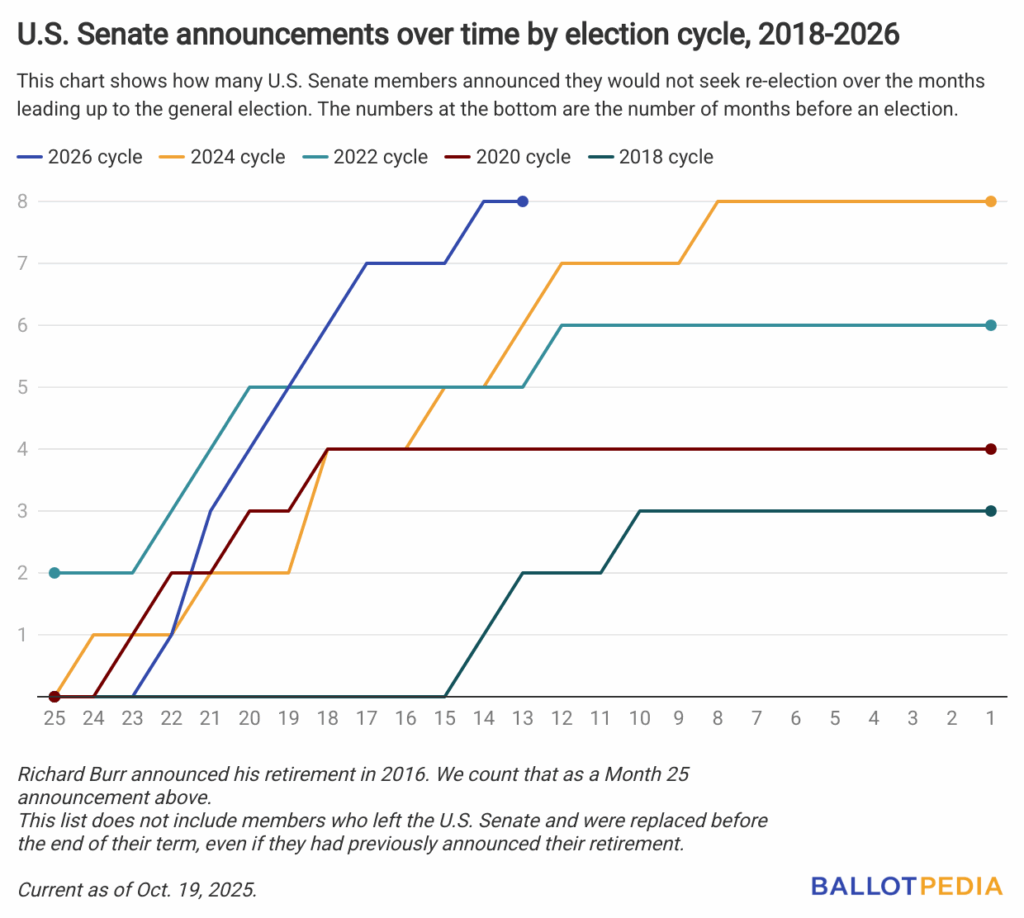
Between January 2011 and October 2025, 384 members of the U.S. Senate and House announced they would not seek re-election. January had the highest number of announcements of any month at 69. June had the fewest at 16.
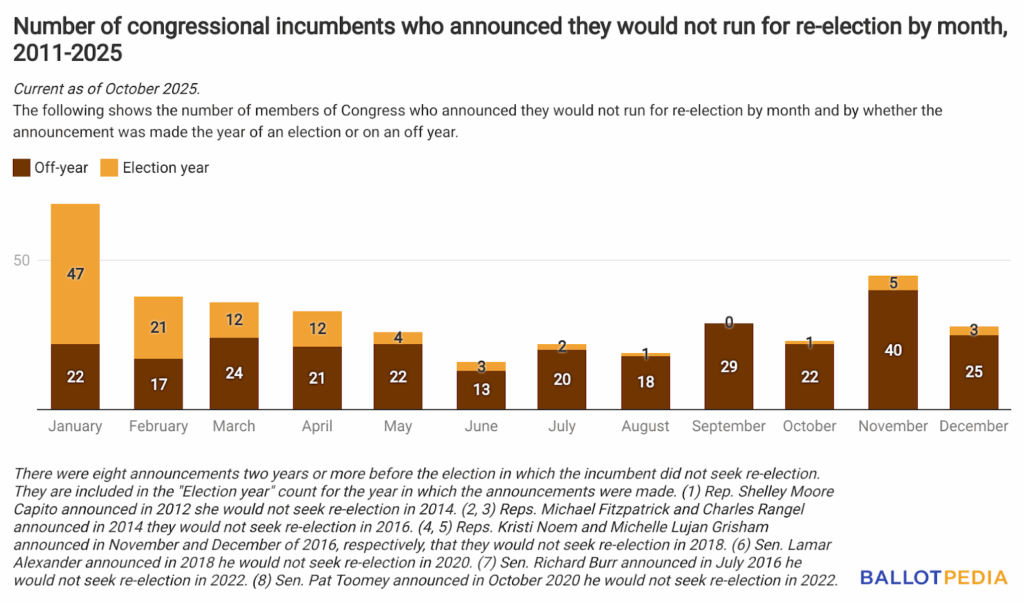
Click here to read more about senators who are not seeking re-election in 2026, and here for more about U.S. representatives who are not seeking re-election in 2026.


